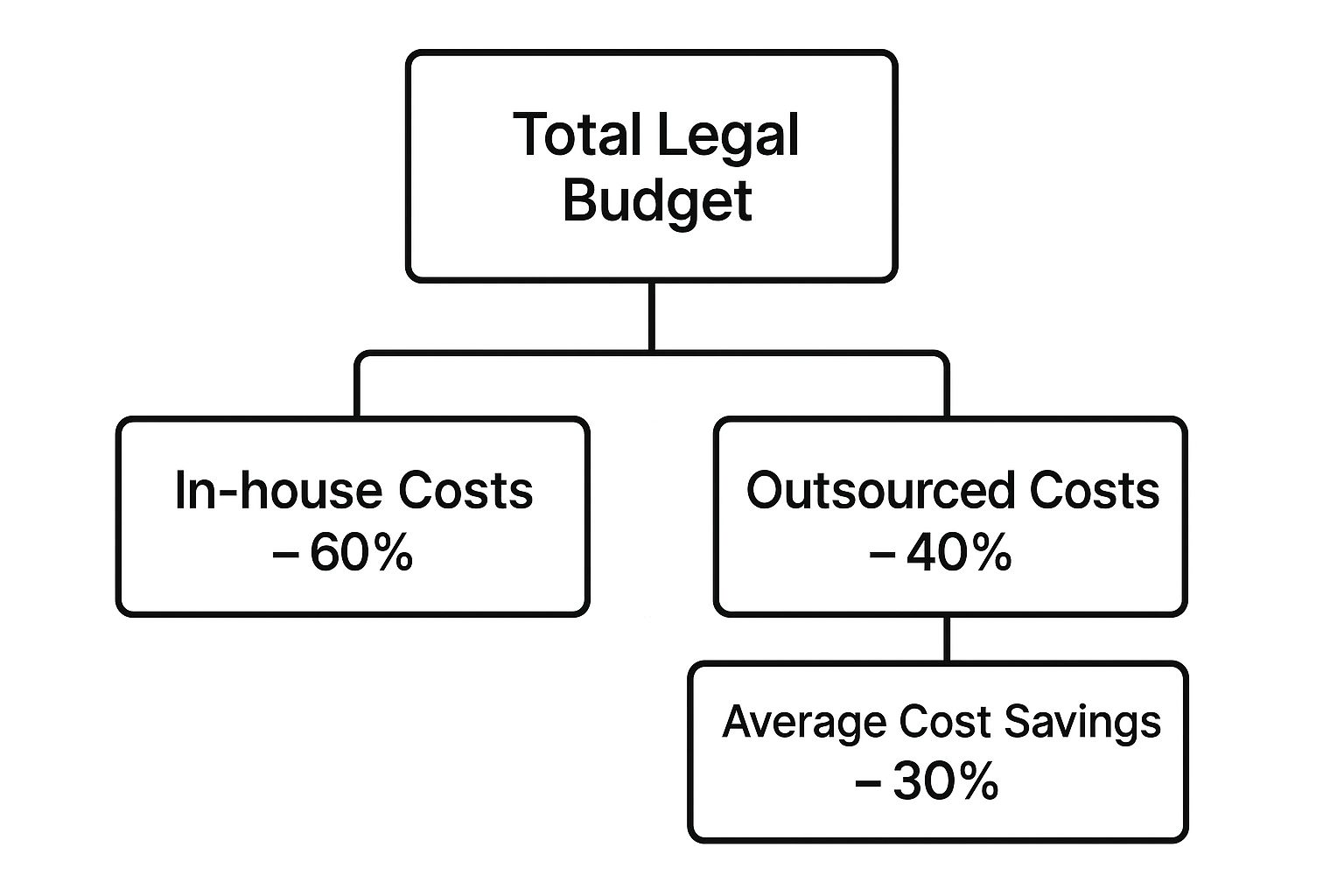
 23 minutes read
23 minutes read
You didn't start a company to spend your days drowning in contract reviews and compliance paperwork. Let's be real. Legal service outsourcing is just a fancy term for smartly handing off the legal grunt work to someone who lives for it. This frees up your key people to focus on what they do best: actually building the business.
Turns out there’s more than one way to get elite legal support without mortgaging your office ping-pong table.
You’re here because the old way of handling legal work is a massive, expensive time-suck. You're staring at a mountain of NDAs, vendor agreements, and compliance forms, wondering if this is what being a founder is all about.
Spoiler alert: it’s not.
Enjoy spending your afternoons fact-checking routine documents? Good, because that can quickly become your full-time job if you don't have a better system.
Trying to handle all legal work yourself or leaning on a single, overworked in-house counsel feels like saving money. But it’s a trap. Your best people end up bogged down in administrative drudgery instead of focusing on the high-value strategic work that actually grows the business.
This is where legal service outsourcing (LSO) strolls in. Think of it as hiring a world-class pit crew for your legal engine. They handle the routine maintenance—document reviews, legal research, contract management—so your driver can focus on winning the race. It’s not about replacing your team; it’s about making them a hell of a lot more effective.

It's a simple calculation: Is your top legal mind’s time better spent negotiating a critical M&A deal or redlining a standard SaaS agreement for the fifth time this month? If you hesitated, you’re already losing money.
This shift isn't just happening in your head. The entire industry is waking up. The global market for this kind of work, often called legal process outsourcing (LPO), is currently valued at around USD 21.6 billion. It’s projected to explode to USD 157.9 billion by 2035. That's a compound annual growth rate of roughly 22.0%. You can learn more about these legal market projections to see just how fast things are changing.
This isn’t some fleeting trend; it’s a fundamental change in how smart businesses operate. Companies are realizing they can get elite-level support without the crushing overhead of a huge in-house department. Our own experience providing expert legal outsourcing services shows that businesses don't just save money—they gain a serious competitive edge. (Toot, toot!)
To put this in perspective, let’s quickly compare how common legal tasks get handled in-house versus with an outsourced team.
| Task | In-House Approach | Outsourced Approach |
|---|---|---|
| Contract Review | Your general counsel or a junior lawyer reviews it, often juggling ten other priorities. It's slow. | A specialist reviews it immediately. They've seen hundreds of similar contracts and know exactly what to look for. Faster, sharper. |
| Legal Research | An in-house paralegal spends hours digging through databases. This is billable time, whether they find what you need or not. | A dedicated research team with access to premium tools finds the answer quickly and more cost-effectively. No wasted motion. |
| Document Management | Often becomes a chaotic, shared-drive mess. Finding a specific clause from a 2-year-old agreement is an afternoon project. | A professional team implements a system, tags documents properly, and ensures everything is organized and instantly searchable. Sanity, restored. |
As you can see, the difference isn't just about cost—it's about efficiency, expertise, and getting things done right the first time.
This guide will cut through the jargon and get straight to what LSO means for your bottom line. We’ll have a real-world conversation about whether it’s the secret weapon your business has been missing. Let’s get into it.

If your in-house counsel always looks like they're drowning in paperwork, it's because they are. They're trying to balance high-stakes strategy with mind-numbing administrative tasks, and that split focus is costing your business more than you realize.
The real power of legal service outsourcing isn't just about cutting costs—it's about strategic liberation. It’s about getting your best legal minds out from under the mountain of e-discovery, contract management, and document review.
When they’re free from that drudgery, they can finally focus on the high-value work that actually protects and grows your company. This isn't about replacing your team; it's about reinforcing it.
Let's be honest: the old model is broken. Paying a senior lawyer a six-figure salary to spend 30% of their day on work a skilled paralegal could knock out is just bad business. It's like using a sledgehammer to crack a nut—inefficient, expensive, and a complete waste of top-tier talent.
The hidden costs are the real killers: missed opportunities, slow contract cycles that stall revenue, and the inevitable burnout of your most valuable people. An overwhelmed legal team quickly becomes a bottleneck instead of a strategic advantage.

The most expensive mistake you can make is paying a premium for strategic advice and then burying that advisor in administrative tasks. It's the corporate equivalent of buying a race car and only driving it in school zones.
Legal service outsourcing completely flips this script. It lets you match the task to the right talent at the right price, so you're not overpaying for routine work but still get expert oversight where it matters most.
So, what do you actually get out of this? The benefits of LSO aren't just theoretical talking points; they are concrete, measurable advantages that give you a serious competitive edge.
Radical Cost Reduction: This is the one everyone talks about first. Instead of the massive overhead of a full-time, in-house hire (salary, benefits, office space), you get on-demand expertise. You can get a better idea of the numbers by looking into typical https://hireparalegals.com/virtual-paralegal-rates/.
Access to Specialized Expertise: Need a paralegal who lives and breathes intellectual property filings or complex litigation support? Finding that person and hiring them full-time is a long, expensive headache. Outsourcing opens up a global talent pool of specialists you couldn't otherwise access.
Operational Efficiency and Speed: An outsourced team can work across different time zones, which can slash turnaround times for things like document review. That kind of agility means your business moves faster, closes deals quicker, and can respond to legal challenges without missing a beat.
Today's legal outsourcing is powered by technology. It's not just about more hands on deck; it's about smarter systems. AI-enabled services, for example, can cut document review times by up to 80% while actually improving accuracy.
While old-school services like e-discovery are still a huge part of the market, the real growth is in AI-enhanced solutions. This tech-first approach means you’re not just getting work done for less money; you're getting it done better and faster, with systems that reduce human error and deliver more reliable results.
By offloading the high-volume, process-driven work, you give your core team the space they need to think, innovate, and strategize. And that's where their true value has been all along.
Let's get one thing straight: thinking all legal service outsourcing is the same is the first rookie mistake. It’s like saying all cars are identical—a Ferrari and a Ford pickup both have four wheels and an engine, but you definitely wouldn't use them for the same job. Picking the wrong model is a fast track to frustration and wasted resources.
Not all legal work is created equal, so the way you outsource it shouldn't be a one-size-fits-all solution either. We need to dissect the main approaches so you can find the right fit for your company, your budget, and frankly, your sanity. Each model comes with its own set of headaches and rewards, so let's pop the hood and take a look.
First up is direct outsourcing. This is the hands-on, "I'm in the driver's seat" model. You find the talent, you manage the relationship, you assign the work, and you handle the quality control. It gives you maximum control, which is great if you need to keep a tight rein on things.
What’s the upside? You get a direct line to your outsourced team and can keep costs incredibly lean. The downside? Hope you enjoy project management and figuring out time zones, because that’s now part of your job. This model is perfect for specific, well-defined projects but can quickly become a major time-suck if you’re trying to juggle multiple complex workflows.
This visual shows a common breakdown of how a legal budget can shift with outsourcing, often creating substantial savings.

The key takeaway here is that even a moderate shift in your budget towards outsourcing can yield a 30% savings on those delegated tasks.
Next is the managed services model. Think of this as hiring a general contractor for your legal work. You tell a specialized provider what you need—say, a full-service contract review desk or end-to-end litigation support—and they build and manage the entire team to get it done. You get one point of contact, one invoice, and a whole lot less to worry about.
They handle the hiring, the tech stack, the security protocols, and all the day-to-day management. You're buying a result, not just renting bodies. This is ideal for large-scale, ongoing needs where you want predictable outcomes without the operational headache.

The real value here is offloading the management burden. You're not just outsourcing the task; you're outsourcing the entire operational function. This frees your team to focus solely on high-level legal strategy.
Of course, this premium service comes at a higher price point than going direct. You're paying for convenience and proven expertise, which can be a brilliant investment if your time is better spent elsewhere.
Finally, there’s the hybrid model. This is for those of us who want our cake and to eat it too. You might keep your core in-house counsel for high-stakes strategy but use a managed service for high-volume document review and a direct freelancer for niche, specialized research.
This model lets you mix and match. You can get the cost benefits of direct outsourcing where it makes sense while leaning on a managed service for the heavy lifting. It requires a bit more coordination on your part, but it’s incredibly flexible and allows you to tailor your legal service outsourcing strategy precisely to your business needs. This is about being surgical, not just swapping one big expense for another.

So, you’re sold on the concept. Now for the hard part: sifting through a sea of providers who all claim to be the best thing since sliced bread. The real challenge is finding a legal service outsourcing partner who won't just take your money and deliver a steaming pile of mediocrity.
This isn’t about falling for glossy brochures or a slick sales pitch. It’s about kicking the tires, looking under the hood, and making sure the engine is actually there. After all, a bad partnership isn't just a waste of money—it's a massive risk to your firm and your clients.
Every LSO provider's website is a masterclass in buzzword bingo. They’ve all got "AI-powered solutions," "synergistic workflows," and "next-gen legal tech." But what does any of that actually mean for your day-to-day operations? Your job is to cut through the fluff and find out what’s real.
Don't be shy. Ask for a demo. Make them show you the technology they claim to use. If they can’t give you a straight answer or a live walkthrough, it might be because their "advanced AI" is just a team of people in a different time zone working off a clever spreadsheet.

A provider who is vague about their technology or security is a provider with something to hide. Transparency isn't a bonus feature; it's the absolute minimum requirement for being trusted with your sensitive legal data.
And speaking of security, verifying their protocols is non-negotiable. A data breach is a very, very expensive "oops." Ask them directly about their compliance certifications (like ISO 27001 or SOC 2), data encryption methods, and employee background check processes. If they hesitate, you walk. It’s that simple.
Once you’re comfortable with the tech and security basics, it’s time to dig into how they actually work. You need to know if their process fits your reality, not just their sales deck. The right partner will have solid, detailed answers, not just platitudes.
Here are a few questions that separate the pros from the pretenders:
Finally, check their references. I don’t mean the two glowing testimonials plastered on their homepage. Ask for contacts at companies similar to yours in size and industry. A confident provider will have a list of happy clients ready to go.
Choosing the right LSO partner is a high-stakes decision, so it pays to be methodical. The checklist below is a solid starting point for evaluating potential providers and ensuring you cover all the critical bases before signing on the dotted line.
| Evaluation Area | Key Questions to Ask | Red Flags to Watch For |
|---|---|---|
| Technology | Can you show me a demo of your platform? What specific tools do you use for [task]? | Vague answers, heavy use of buzzwords without specifics, and a refusal to provide a demo. |
| Security | What security certifications do you hold? How is our data encrypted and stored? | A lack of formal certifications, unclear data handling policies, or "Trust us, it's secure." |
| People & Expertise | What is the average experience level of your team? What is your staff turnover rate? | High turnover rates or an inability to provide concrete details on team qualifications. |
| References | Can I speak with 2-3 current clients in my industry? | Reluctance to provide references or only offering pre-written, generic testimonials. |
For certain specialized tasks like discovery or document preparation, you might find that exploring freelance paralegal services first can give you a better feel for the quality of talent available in the market.
Ultimately, take your time, do your homework, and trust your gut. The right partner won't just save you money; they’ll become a genuine extension of your team, freeing you up to focus on what you do best.

Let's talk about the cold sweat moment. It’s that feeling you get right before you hand over the keys to a critical part of your legal operations. The fear of losing control, of work quality dropping off a cliff, or of a catastrophic confidentiality breach is very, very real. I've been there.
Handing over legal work isn't about blind trust; it's about building a bulletproof system of verification. You need a framework that lets you delegate without disaster, so you can actually sleep at night. This is how you build one.
Your relationship with a legal service outsourcing provider lives and dies by the clarity of your expectations. If you don't define what "done" and "done right" look like from day one, you're basically paying for expensive misunderstandings. I call it "The $500 Hello"—that first invoice for work that completely missed the mark.
To avoid this, you need a crystal-clear Service Level Agreement (SLA). And I don't mean some boilerplate template. Your SLA should be a living document that outlines everything.

A vague SLA is worse than no SLA at all. It creates a false sense of security while leaving gaping holes for quality issues and miscommunication to crawl through. Get it in writing, and get it right.
Once the rules are set, you need a scoreboard. But tracking the wrong things is just as useless as tracking nothing at all. Forget vanity metrics like "hours billed"—they tell you nothing about value. Focus on performance indicators that actually impact your business.
What should you be tracking?
This data-driven approach removes emotion and guesswork. You're not just hoping the work is good; you have the numbers to prove it.
Finally, let’s talk security. The key drivers pushing companies toward legal service outsourcing—rising costs and escalating compliance needs—are the same reasons you can't afford a data breach. Shifting non-core legal tasks to specialized providers in lower-cost regions is a massive strategic advantage, but only if your data is locked down tight.
The savings from both labor and overhead are meaningless if your client information ends up compromised. You can explore more about these key market drivers and their impact on outsourcing growth to understand the full picture.
Top-tier LSO providers understand this. They build "ethical walls" and digital fortresses to protect sensitive information. Before you sign anything, demand to see their security credentials. Ask about their data encryption, access control policies, and employee confidentiality agreements. This isn’t about being difficult; it’s about doing your due diligence.
Because when it comes to your data, control isn't a luxury—it's everything.
So, you're sold on the idea. But the million-dollar question remains: what exactly should you hand off? Deciding what to outsource isn't just about cutting costs; it's about being smart with your team's most valuable asset—their time and expertise. Get it wrong, and you've just traded one set of problems for another.
Think of your senior counsel as a top surgeon. You wouldn't ask them to handle administrative paperwork or sterilize instruments. You want them in the operating room, focused on the complex, high-stakes procedure. The same principle applies here. The goal is to offload the high-volume, repetitive work so your A-team can focus on winning the game.
Let's break down what makes sense to delegate and what you should protect at all costs.
Some tasks are practically tailor-made for outsourcing. These are the jobs that are process-heavy, time-consuming, and don't necessarily require a deep understanding of your company's secret sauce. Moving them off your team's plate is often the fastest way to see a real impact on your budget and efficiency.
Document Review and E-Discovery: This is the quintessential example. Manually sifting through mountains of documents for litigation or a due diligence review is a monumental time-sink. Specialized providers, often using powerful AI tools, can churn through this work up to 80% faster than an in-house team. And frankly, their accuracy is often better than a junior associate's after a 14-hour day.
Contract Lifecycle Management: Your team shouldn't be spending half their day on routine NDAs, standard vendor agreements, or basic sales contracts. Outsourcing the day-to-day management of these agreements—from initial drafting and review support to tracking renewals—frees up your senior lawyers to concentrate on the deals that actually move the needle.
Legal Research and Memo Drafting: Need to get up to speed on a specific regulatory change in another country? An outsourced provider with specialists in that area can often produce a detailed, insightful memo in a fraction of the time. This gives your team the critical information they need without derailing their primary projects.
Intellectual Property Portfolio Management: Keeping track of patent renewals, trademark filings, and docketing deadlines across dozens of countries is a complex administrative puzzle. This is a perfect fit for a specialized firm that does nothing but manage IP portfolios. They have the systems and expertise to ensure nothing ever falls through the cracks.
Now, let's talk about the other side of the coin. Some functions are so central to your company's strategy and identity that handing them over to a third party would be a massive mistake. Outsourcing these is like outsourcing your company's brain.

Your core legal strategy is your company’s DNA. It dictates how you navigate risk, pursue opportunities, and defend your competitive advantage. Keep it in-house, close to the chest, where it belongs.
Here’s the work that should always remain with your core team:
Making the right call on what to outsource isn't just a financial decision. It's a strategic one that sharpens your legal team's focus on where they can deliver the most significant value.
Alright, let's talk about the questions that are probably still bouncing around your head. By now, you've seen the potential of legal service outsourcing, but it’s natural to have a few nagging doubts. Let’s tackle them head-on with some straight answers to the most common concerns we hear.
Think of this as the final check-in before you decide if this is the right move for you.
This is easily the biggest myth out there. If your only goal is to find the absolute rock-bottom hourly rate, you're setting yourself up for failure. That's the fast track to sloppy work, missed deadlines, and a final product that costs you far more to fix than you supposedly "saved."
Smart legal outsourcing is about finding the best value, not just the cheapest help. It's about matching the right price to the right skill set. You aren't just buying hours; you're buying efficiency, deep expertise, and the freedom for your core team to focus on the big picture, not the tedious administrative tasks.

Chasing the lowest bidder in legal work is like buying the cheapest parachute. It might feel like a savvy deal on the ground, but you’ll regret it when it really matters. Quality and reliability are the only metrics that count.
This is a perfectly valid and crucial question. The idea of handing over confidential client information or internal documents to a third party can feel like a massive leap of faith. But here’s the reality: a reputable LSO provider’s entire business is built on trust and security. One breach, and their reputation is gone.
In many cases, their security protocols are far more robust than what a small or mid-sized firm could build on its own. They have to be. Before you sign anything, look for providers who can show you their compliance certifications, like ISO 27001, and who have clear, documented procedures for data encryption, access controls, and employee background checks. Honestly, they should be even more paranoid about your data than you are.
Let's be blunt: for certain specialized tasks, it can actually be better. Your in-house paralegal is likely a generalist, juggling a dozen different responsibilities. An outsourced specialist in, say, IP docketing or e-discovery, does that one thing all day, every day. They've fine-tuned their processes and have access to specialized tools your team probably doesn't.
The secret is in the quality control you establish from day one. It’s your job to set clear expectations and performance metrics.
This isn’t about blind faith; it's about building a system of verification. It’s how you delegate effectively without ever losing control over the final outcome.
Ready to stop drowning in routine legal work and start focusing on growth? At HireParalegals, we connect you with pre-vetted, expert legal support so you can scale smarter, not harder. Find your perfect paralegal in under 24 hours.